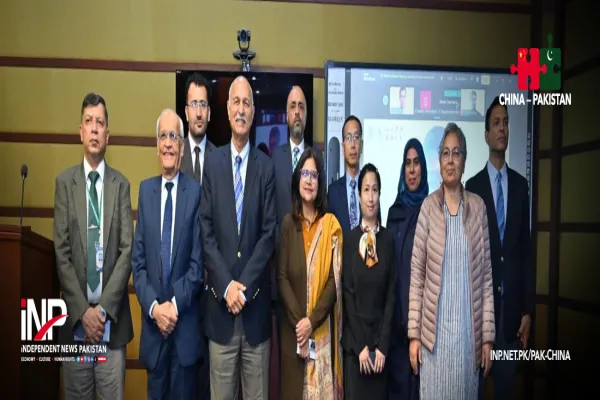i NEWS PAK-CHINA
Chinese team’s hybrid wheat demonstration fields in Pakistan have been maintained at about 3,000-5,000 hectares. “From Peshawar and Islamabad in the north, Lahore in the center to Karachi in the south, our hybrid wheat has performed well in all the major producing regions”, said Prof Zhao Changping, Chief Scientist of Hybrid Wheat Research Institute, Beijing Academy of Agriculture and Forestry Sciences in an interview with China Economic Net (CEN).
“What’s more gratifying is that through the cooperation of scientists from both sides, we discovered that using the Pakistani wheat varieties as distant parent to cross with Chinese wheat, the varieties produced are more dominant. In addition, hybridization of spring wheat in the southern wheat region and winter wheat in the northern wheat region can also produce dominant hybrids.”
The report stated, “The World Food Day highlights the need for global efforts to ensure food security in various countries of the world,” last year, Prime Minister Shehbaz Sharif tweeted, expressing his concerns over the impending food shortage in the wake of floods. In 2022, devastating floods in Pakistan have destroyed standing crops on millions of hectares.
Undoubtedly, wheat, a staple food, has also been hit hard. About 80 percent of farmers in Pakistan are engaged in wheat production, and the total area of wheat cultivation occupies as much as 40 percent of the total agricultural land in Pakistan. The importance of wheat production in Pakistan cannot be overstated.
In addition to natural disasters such as floods and high temperatures, a series of challenges such as high seed and fertilizer prices also make Pakistan’s “wheat revolution” increasingly urgent. Over the years, a group of Chinese wheat experts working diligently and quietly here.
“Hybrid wheat is considered to be the first choice to solve the food crisis in the international agricultural science community," “When it comes to China-Pakistan hybrid wheat cooperation, the selection and breeding of hybrid wheat varieties suitable for the local environment requires the cooperation of both parties.
Therefore, we have established test stations in Peshawar, Lahore, and Yuanmou in Yunnan Province, which is very similar to Pakistan’s local climate,” Prof Zhao said. It is learned that so far, the Chinese team’s hybrid wheat demonstration fields in Pakistan have been maintained at about 3,000-5,000 hectares. “From Peshawar and Islamabad in the north, Lahore in the center to Karachi in the south, our hybrid wheat has performed well in all the major producing regions”, emphasized Zhao.
“What’s more gratifying is that through the cooperation of scientists from both sides, we discovered that using the Pakistani wheat varieties as distant parent to cross with Chinese wheat, the varieties produced are more dominant. In addition, hybridization of spring wheat in the southern wheat region and winter wheat in the northern wheat region can also produce dominant hybrids.”
“The emergence of new varieties has given us momentum as we solve the two main problems, yield and disease resistance," added Prof Zhang Shengquan, Deputy Director of the Hybrid Wheat Research Institute of BAAFS, “In 2019, after nearly ten years of cooperation, the selected hybrid wheat combinations, such as the new variety BH1683, have increased by more than 20 percent in Pakistan for three consecutive years, and can be widely used in the wheat regions in central and northern Pakistan, including Lahore and Peshawar.
In addition, in the joint experiment between China and Pakistan, even if the sowing amount was reduced by 80-90 percent, BH1683 still has the potential to increase yield by 20 percent. After the introduction of the dominant genes of Chinese wheat, its disease resistance is also more advantageous than that of local varieties”
“Several Pakistani scientists who have been in contact with me for a long time, such as Dr. Muhammad Arif, Department of Agronomy UAP, have mentioned that wheat production in Pakistan has encountered unprecedented challenges. For instance, last year's rare high temperature once again tested Pakistan’s traditional wheat varieties, which has also deepened the understanding of China and Pakistan on the cultivation and application of wheat hybrids to ensure food security.
At present, our pace of cooperation is accelerating, and is moving towards the direction of joint research to global food security,” Prof Zhang told the CEN. “We are working closely with the University of Agriculture, Peshawar and GUARD Agricultural Research & Services Private Ltd. In addition, the Ministry of Science and Technology of Pakistan, in addition, the Ministry of Science and Technology of Pakistan, the Pakistan Agricultural Research Council, and the Chinese Embassy in Pakistan have also support us as far as they could.”
At the end of the interview, Professor Zhao noted that this year marks not only the 10th anniversary of the Belt and Road Initiative, but also happens to be the 10th anniversary of China’s hybrid wheat going global. “China-Pakistan hybrid wheat cooperation is a model of high-tech agriculture going international, and a sign of China-Pakistan friendship.
It is our incontrovertible mission as agricultural practitioners to develop hybrid wheat to benefit the people of Pakistan and the whole world. I predict that by around 2030, not only Pakistan, not only South Asia, our hybrid wheat will enter the stage of large-scale application in all continents.”
Credit: Independent News Pakistan-INP









